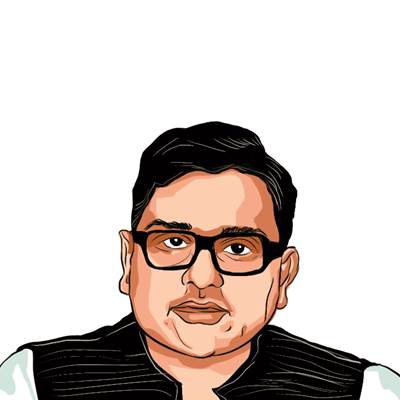Opinion Imtiaz Ahmad: A scholar who challenged conventional research on Indian Muslims
He was a chronicler of the multiple Muslim identities in India
 It is important to clarify here that Ahmad did not produce these volumes simply to establish his supremacy as a revisionist scholar of Indian Islam. Instead, he encouraged disagreements, ideological plurality and creative frankness.
It is important to clarify here that Ahmad did not produce these volumes simply to establish his supremacy as a revisionist scholar of Indian Islam. Instead, he encouraged disagreements, ideological plurality and creative frankness. “Oh… Ahmed, Ahmad and Ahmad! Do you all belong to the same caste?” A Delhi University counter clerk made this comment while observing a uniformity of surnames in my MPhil examination form in the mid-1990s. My thesis supervisor, Riaz Ahmad, had approached Imtiaz Ahmad to ask him to examine my dissertation — which he happily agreed to — and the clerk wanted to know the connection between the three of us. My supervisor tried his best to explain to the curious clerk that Muslim surnames do not always reflect the caste identity of an individual. However, his academic answer did not satisfy the clerk at all.
I evoke this funny and almost insignificant episode for two reasons. First, it reminds me that I had only one formal academic connection with the legendary teacher Imtiaz Ahmad, who passed away in Delhi on June 19. He was an examiner for my first research degree. But the second reason is deeply personal and, in a way, emotional. I think the DU clerk was right. I do belong to Imtiaz Ahmad’s caste — the caste of students and researchers that follows his works as an unwritten norm intellectually, critically and of course, professionally. In my view, the most appropriate mode to commemorate the legacy of Imtiaz Ahmad is to celebrate his contributions to shaping the intellectual agendas of this caste of scholars in India and abroad.
A few words about his professional academic life. Imtiaz Ahmad was a political sociologist. He received his training at Lucknow University and the Delhi School of Economics. He taught at Delhi University and JNU for over four decades. He was also a Fulbright scholar at the University of Chicago.
He started his intellectual journey in the late 1960s. Ahmad was interested in exploring the nature of caste-based social stratification among Muslims in India. However, he was deeply unhappy about the state of sociological studies at that time. We find a serious sense of unease in Ahmad’s early writings. In an essay written in 1972, he argued that sociological studies on India did not give importance to the social structures of non-Hindu communities. He also identified a strange tendency to generalise the sociology of the Hindus as the sociology of India.
This search for a multifaceted “Indian sociology” became the foundation of four major books, which Ahmad edited in the 1970s and 1980s. These volumes were based on a set of deeply engaging essays written by various authors on a variety of socio-cultural aspects concerning the Muslims of South Asia. These studies produced a persuasive argument that a synthesis has been worked out in South Asia between the high Islamic ideals and custom-centric traditions. Precisely for these reasons, there is a need to recognise various expressions of lived Islam(s) for making sense of the actualities of Muslimness.
It is important to clarify here that Ahmad did not produce these volumes simply to establish his supremacy as a revisionist scholar of Indian Islam. Instead, he encouraged disagreements, ideological plurality and creative frankness. His carefully written introductions do not make any attempt to divert the basic thrust of different essays. As a result, these pathbreaking volumes were able to introduce the grass roots-based sociology of Muslims in India to wider intellectual publics. At the same time, Ahmad’s adherence to argumentative openness helped in producing vigorous intellectual discussions on various facets of the Indian Muslim identity.
In my view, there are two very important aspects of Ahmad’s intellectual contribution, which are relevant to us. First of all, Ahmad seems to make a conscious distinction between the past and history. His writings encourage us to acknowledge the significance of the past in the everyday life of Muslims. However, he does not want us to overemphasise the historical facts/categories to understand contemporary Muslim societies. He was very critical of this peculiar adherence to Islamic history, which created an impression that Indian Muslim societies could only be understood as a residue of their Islamic past. Ahmad wanted to get rid of this historical stiffness in order to understand the flourishing and ever-changing realities of Muslims in India.
Secondly, Ahmad was also critical of macro generalisations. He argues that we should not look for any fixed, permanent and universally applicable model for explaining Muslim sociological diversity. Instead, the localised expressions of caste, language, gender and class must be taken into consideration to evolve empirically rich and analytically sophisticated explanations. In other words, one has to study the complex sociological “merger” between the ever-evolving local cultures (which should not be entirely understood as “Hindu” culture) and the non-Hindu communities to produce what he calls a sociology of India.
Are we going to achieve it? A couplet he sent me last year on Diwali as a greeting is very relevant to answer this question: Chiragan kar ke kyon dil bahla rahe ho duniya walon/Andhera lakh roshan ho ujala phir ujala hai. (Why are you satisfying yourself by lighting lamps/ No matter how bright it is at night, it can’t compare with daylight.)
The writer is associate professor, CSDS




